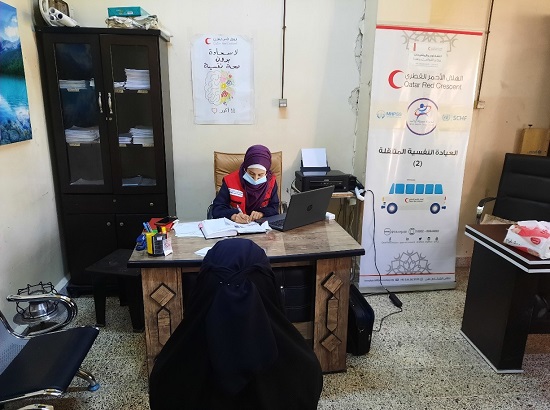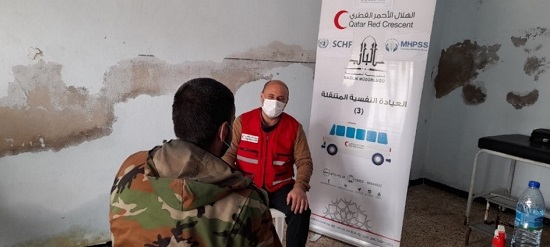1 August 2021 – Each month we present some human interest stories about people whose lives have been changed thanks to the generous and continuous support of the European Civil Protection and Humanitarian Aid Operations (ECHO) and the relentless dedication of our partners on the ground in northwest Syria.
The story of Um Khaled and her experience with depression disorder
Um Khaled is 42 years old and was displaced from the Damascus countryside to Idlib. She has been divorced for a long time and her daughter lives far from her and her other child has been living with his father since the divorce. She is currently living alone in her friend's house without any privacy, far from all her family members who all live in and near Damascus. She has no relatives in Idlib and was displaced there due to the conflict.

For more than 7 months, Um Khaled had suffered from symptoms of chest tightness, headaches, sleep disturbance, and a lack of interest in daily activities. Also, her bad financial status increased the severity of her symptoms and she was always crying and generally in a heightened state of depression. One day, she took action to visit the mobile clinic run by the Qatar Red Crescent Society and supported by WHO through the ECHO fund.
At the centre, the psychosocial worker developed a comprehensive approach and established an appropriate care plan for Um Khaled to reduce the severity of her client’s psychological symptoms and provide psychosocial support to improve overall well-being and resilience. The psychosocial worker implemented interventions to achieve these goals that focused on providing psychoeducation to her client about depression, its symptoms and how to deal with them. She also communicated with the client’s friend and her family (the only trusted people in displacement) and engage them in the psychosocial support programme and referred her to a women's centre to help her engage in the programme and empowerment activities.
Due to the ECHO fund that enabled WHO to support the mobile clinic, the life of Um Khaled has dramatically improved and her outlook on life has become more positive and focused. Um Khaled’s depressive symptoms were reduced after she received mental health and pyschosocial interventions and her social status improved. Also her friend succeeded in resolving the marital dispute between her and her husband as she has since been granted access to see her young child. We are also very happy to report that she has become a seamstress after engaging in empowerment activities in the women's centre and is now able to work and support herself.
The story of Abdullah and his experience with psychosis disorder
Abdullah is 37 years old has been separated from his wife for the past 4 years due to a worsening psychological condition. He lives in the Aleppo countryside with his widowed mother and his married brother, who has 3 children and they live in a very basic house that is not really inhabitable.
After his separation from his wife, he started to experience strange symptoms and behaviours. He became afraid of many things, sometimes even the sound of people's voices, and a state of nervousness, panic, anxiety and tension overcame him. He started to isolate himself so he quit his job and he refused to leave his house. As a result, his economic situation declined and his problems multiplied. The severity of his condition and symptoms worsened. He began to suffer from auditory and visual hallucinations and started clinging to false beliefs and delusions. He slowly became addicted to captagon pills.
Abdullah’s mother heard of the mobile mental health clinic in their place of residence, so she visited the clinic asking for assistance. The psychosocial worker developed a comprehensive approach and established an appropriate care plan to reduce the severity of his psychological disorder and provide psychosocial support for the other family members. Abdullah was referred to the mental health hospital in Azaz because of the severity of his disorder
The psychosocial worker implemented interventions to provide psychoeducation for the client's family (mother and older brother) about the psychological disorder and the client’s needs during the period ahead. He also set about providing psychological support to the mother to deal with her symptoms of distress that included severe crying and fatigue and referred the family to a organization which provides shelter services to improve the conditions of people's houses. Also, the psychosocial worker referred the children of the older brother to an organization that provides child protection services because risks were identified among the children.

The effect of such treatment was astounding and has changed the life of Abdullah and his whole family and within a month in Azaz hospital his psychotic symptoms were greatly reduced. His health improved as too did the health and psychological status of his mother. The house that they lived in underwent improvements with support from the organization. The children of his brother too have benefited and are now all safe and functional and back at school.
Due to the ECHO funds that enabled WHO to support this mobile clinic, the life of Abdullah and his immediate family have become more hopeful and he is slowly regaining calmness and serenity. Abdullah’s case was one of the more extreme cases of mental health disorder and we are very pleased to announce that due to ECHO’s continual support to WHO and this mobile clinic, both he and his family are living in a healthy and happy home, with bright visions of the future.


